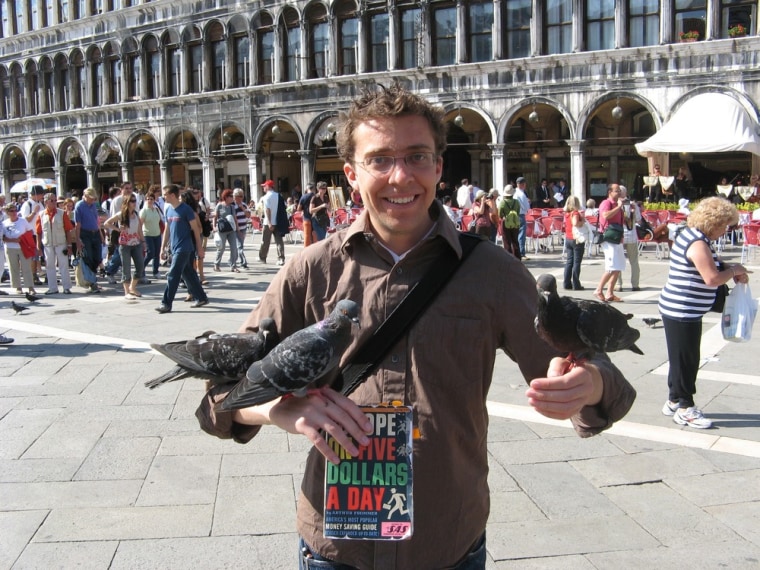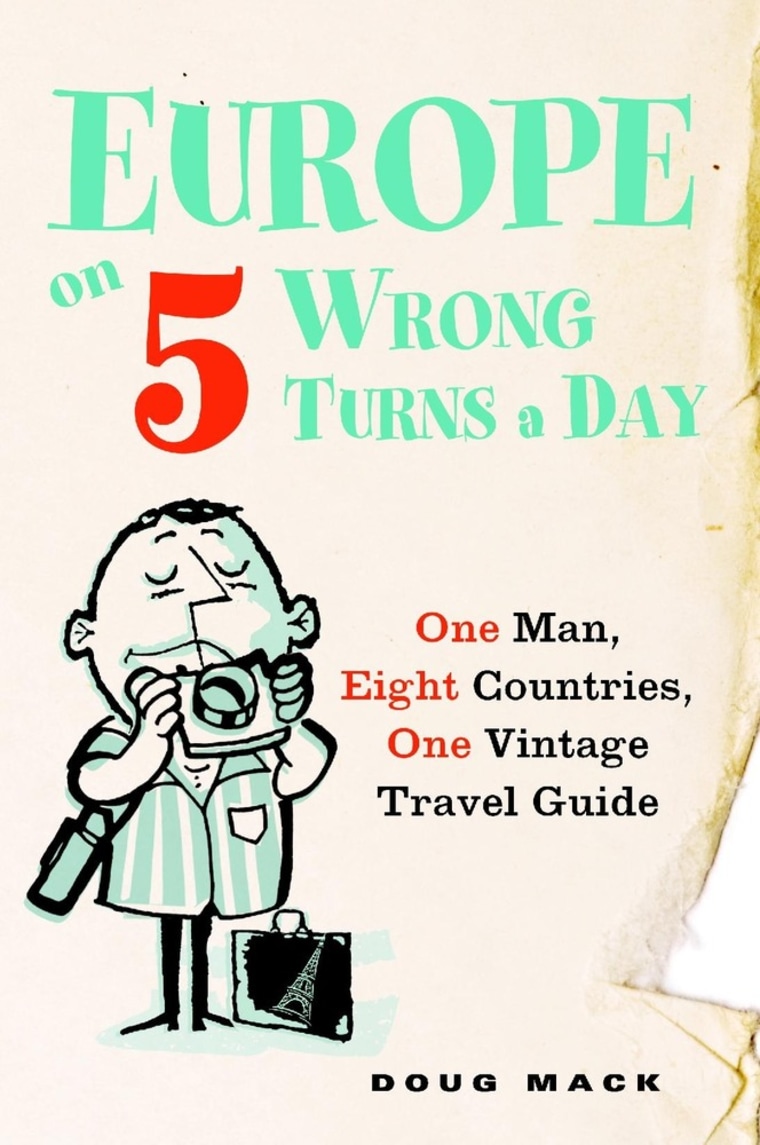
Most of us are not like Indiana Jones, and do not want to travel like we are. And that’s the premise behind a new book that pokes fun at the current trend for travel writers and travelers to seek out the road less traveled.
To research "Europe on Five Wrong Turns a Day: One Man, Eight Countries, One Vintage Travel Guide" (Perigee/Penguin), to be released April 3, author Doug Mack traveled through Europe, visiting many major cities and sites, using a 47-year-old edition of Arthur Frommer’s classic travel guide "Europe on Five Dollars a Day." Along the way, he may have spent far more than five dollars a day, but he discovered the beaten path offered some unexpected surprises.
Mack answered a few questions for msnbc.com:

Why did you write this book?
The back-story is that I was at a book festival in Minneapolis with my mother, and I happened across a copy of "Europe on Five Dollars a Day," which I initially found interesting only because the title was so laughably outdated. When I showed it to my mom, she got all excited: she’d been LOOKING for that! For YEARS! It turned out she had used that book during her own Grand Tour in 1967; she also mentioned that she had all of her letters from her trip.
At first, I was just interested in the family-history angle, but as I dug through the letters and paged through the book, it also struck me that they offered intriguing big-picture views into travel and life in a very different era. I decided go to Europe guided by those letters and that book, both because it seemed like a fun adventure but also to see for myself how the tourist experience had changed in the last generation.
Did your journey turn out to be what you hoped at the outset?
Yes, in the sense that I generally had a great time and found lots of interesting comparisons between then and now.
That said, I had also naively hoped that in every single restaurant and hotel, I'd find an aged proprietor who would instantly recognize my 1963 guidebook and start regaling me with stories about Arthur Frommer, and we would become fast friends, and share many bottles of wine and hours of lively conversation until the wee hours, just like in a movie. Alas, it was not like that all day, every day — more often, I got blank stares from jaded young employees when I pulled out my book. But those awkward experiences also made for amusing stories.
What’s your personal favorite story or experience that you wrote about in the book?
In Rome, I stayed in a place called the Hotel Texas. Frommer's 1963 description runs nearly half a page and raves about its “glamorously-decorated” spaces and sophisticated guests. When I got there, though, it was essentially an archetype of deteriorated grandeur. When I showed my book to the desk clerk, he got very excited and told me he remembered "Europe on Five Dollars a Day," remembered that quote, remembered the glory days. He pulled out a hotel brochure from that era, and pointed out all the praise from other guidebooks and magazines. I had a fantastic time chatting with him over the next few days and hearing all of his stories.
How do you think the book will contribute to travel writing memoirs?
I hope that it helps encourage other writers to take a second look at the so-called “beaten path” and realize that there are still plenty of stories left to tell there. There are two classic archetypes of travel memoir writers: the swaggering adventurers who cheat death on a daily basis, and the corporate dropouts who go to a rustic, charming village to learn “what really matters in life.” Those are all fine and good, but it's interesting how these sorts of books have become cliches in their own right; the road less traveled is actually a bit tediously familiar when it comes to travel writing.
How can readers use your book for better travel experiences?
I was about to make a joke that my book really only serves as an example of what not to do: Don't travel with a decades-old guidebook, or you will get very, very lost. But, actually, getting lost was one of the unexpected and revelatory joys of my unpractical travel method. I don't advocate total ignorance, and there were certainly times when I really wished I had been better prepared and better informed. On the whole, though, I found that getting lost and having to rely on my wits rather than a smartphone or a stack of Lonely Planets ultimately made for a more delightful, interesting, and immersive experience.
I enjoyed reading your descriptions of Arthur Frommer’s early years and his transition to travel guide writing. What were his main contributions to the field, then and also more recently?
Before Arthur Frommer came along, the major guidebooks were aimed at well-off travelers, what one might call the steamer-trunk crowd. Frommer's book had much more populist, middle-class appeal; it was essentially a manifesto for budget tourism, starting with the forthright, catchy title, almost like something from a self-help book: "Europe on Five Dollars a Day." I liken Frommer to Julia Child: they both provided the template and encouragement for the typical American.
The general layout and style of Frommer's book was also different, more clear and concise and intuitive to use: chapter per city, each one divided into neighborhoods, all the recommendations in bold type — it's a template that basically all guidebooks follow today, but which was innovative at the time.
In the 1990s, Frommer's was one of the first guidebook companies to have a major Internet presence, and Frommers.com remains one of the most prominent travel web sites. Arthur Frommer himself has a blog there.
What do you think are the main ways travel guides have changed since the original edition of “Europe on Five Dollars a Day” came out?
The biggest thing is just that there are so many more of them — Frommer's now publishes something like 470 different guidebooks, Lonely Planet has even more, and there are many other publishers. Today’s guides also tend to be more specialized, focusing on a particular city or activity or demographic. I have not yet found a book titled The Extreme Athlete's Guide to the Vatican, but it probably exists.
The coming change, of course, is that guides are going digital. All of the major guidebook publishers also have material online, plus their own smartphone apps, and then there's all the competition from the likes of TripAdvisor and other crowd-sourced sites.
And have they changed for the better or for the worse?
Mostly for the better — planning is easier when there’s so much more information available. However, I think it's a shame that most guidebooks today don't give you a sense of the personality and specific writing voice of the author. Frommer wasn't trying to fit a specific institutional voice or style manual, so reading his book is sort of like hearing tips from a trusted friend, just because of the conversational tone of his writing.
How did “Europe on Five Dollars a Day” hold up? Did your view of it change AFTER you traveled with it?
As you'd expect, most of the hotels and restaurants listed in the book were closed. Others had gone upscale, way out of the range of a budget traveler. Oh, and five dollars a day? Not a feasible daily budget nowadays, shockingly. Some cities were virtually unrecognizable from Frommer's descriptions — Berlin has changed tremendously since the 1960s, obviously — but some, like Rome and Paris, felt basically the same. And in every single city, there were at least a few hotels and restaurants and attractions that were still around and seemingly unchanged since Frommer's day. It held up enough for me to get by.
What is an example of how using “Europe on Five Dollars a Day” got you in trouble, and an example of how it was surprisingly rewarding?
In Paris, "Europe on Five Dollars a Day" led me to a restaurant called Le Grand Colbert, which Frommer says is really cheap and off the tourist path. Well, it turns out that it was featured in the movie “Something's Gotta Give” a few years back, so now it's a huge tourist magnet, and definitely not cheap. I walked in and the maitre d’ gave me this horrified look that basically said, “Sacre bleu, not another one of those Diane Keaton groupies. . . .” It was a spectacularly awkward meal.
There were other times, though, when Frommer's book led me away from the crowds. Like in Munich, there’s this lesser-known neighborhood that he compares favorably to Greenwich Village. I went there and it was still quiet and funky and charming, as Frommer promised; if anything, I think it was less touristy now than it was back then.
Did you send a copy to Arthur Frommer?
Yes, my publisher sent him a book. And I was so nervous about what he would think! I have tremendous respect for him and his legacy, of course, and I trust that comes through in the book, but I also knew that the very nature of the project was probably off-putting to him: I'm a young, upstart writer doing this goofy experiment and also telling his story. But just recently, I heard Mr. Frommer on the radio show "Rudy Maxa's World," and he gave the book a glowing review — he said it was erudite and amusing and he thinks it will be a best-seller. His words, not mine. Here's hoping....
Are you still a committed non-adventurer?
Mostly. I still like to go to seemingly familiar places and find the unfamiliar thing; I really love finding the stories hidden in plain sight. But I'm certainly more adventurous than I was, so we'll see. Maybe my next book will involve using an outdated guidebook to climb Mount Everest.
What is the next travel experience you have planned?
My fiancée is trying to convince me that we should go on a hitchhiking trip in Asia. (As you will have guessed, she's quite a bit more adventurous than I …) I'm still dubious, but she's doing a good sales job, so it might happen. I'm also hoping to spend some time exploring some of the forgotten communities and cultures right here in the United States.
What’s the big message of the book you want readers to walk away with?
My message is basically the same as Frommer's underlying point all those years ago: No matter where you travel, make it your own. What's important isn't following the crowds or even not following the crowds but appreciating a place and a culture on your own terms. Don't be afraid to be a cliché and follow the masses to something really cool; don't be afraid to get totally lost and away from the crowds and out of your comfort zone. Find your own path.
More on Itineraries